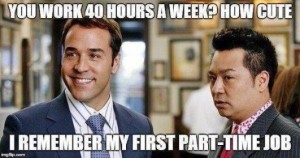When we asked 150 senior executives from Marketing, Sales, Operations, Administration, and Human Resources, what one thing they wanted to make their day more manageable, the vast majority answered with the same response. It wasn’t great software or IT support, it wasn’t higher salary, it wasn’t free sodas or a ping pong table in the break room, or T-shirt day, or birthday cake for all . . . the most popular answer was just one word – Time.
Executives are starved for time – time to think, to contemplate, time to digest and cogitate, time to reflect, time to delegate, to mentor, to research, to connect on more than a cursory level with their colleagues. Prioritizing of their schedules, maximizing time efficiency, finding ways to do more than one thing at a time or to parallel schedule so that multiple tasks coincide, are the number one mental activity on a daily basis for senior leaders.
Their plates are more than full.
Between their own business responsibilities, outside Board affiliations, community and charitable organizations, sponsorship obligations, professional association activities, speaking engagements, family commitments and personal networking, the 18-hour day is becoming standard for senior leaders of national and global firms. While many would intone “That’s why they get the big bucks,” and “should have known before they took the job,” no amount of money or foreknowledge would have compensated or prepared the normal individual for that level of constant activity and commitment. It’s a grinding pace, and it can only be sustained for so long before their personal health and often the health of the firm suffer as a result. The average tenure of a global level, publicly held firm CEO is less than three years, and it stands to reason that the schedule, and the hunt for unscheduled time, might have a great deal to do with that. While capricious boards, fickle investors, vague and punishing financial markets add their own land mines to an already dangerous traverse, the level of personal energy required is virtually unsustainable by the average human.

For those who need access to, and engagement from, these top C-Suite officers, this insight could mean the difference between productive contact and being put in the “pay no mind” column. Long, rambling voice mails, five-page e-mails, 9-lb promotional brochure bombs, 40-page white papers, are just not in these guys’ future, and will not only deny you the attention you need, but irritate the recipient for not respecting the limited time they have available for such activities. It’s not that they don’t want to engage with you, or that they’re ignoring you, it’s just that you’ve come in at the end of a very long priority string, and have to wait your turn. The more hurdles you place in the way of that turn being productive, the lower your odds of connecting in a meaningful way.
Short, sweet, decisive, get-to-the-point type communications win the day for these guys – strong, direct images, simple, direct language, compelling offers, real business cases that apply directly, and have relevance to them, are the key to success. Think about it: if you have a line of people waiting outside your office, a full calendar, a charity dinner and speech to prepare, and are flying to a board meeting later in the week, the last thing you want to do is wade through a long, rambling memo, a multi-page brochure with a barely comprehensible letter, with a tentative, limp offer that barely fits within the company’s “needs” basket. Poor choice of activities at best, when there are that many other, potentially more lucrative things waiting in the wings. A short e-mail promising a viable alternative and offering lunch next week, a few sentences at best, is more likely to get some attention.
Time is one of the few elements of a person’s job that they have limited control over. Time can’t be manufactured, can’t be augmented, can’t be stopped or delayed, bought, coerced, finagled, negotiated or bullied. It marches onward, unbidden and unaffected by your need for more, or to speed up or slow down to make room for more tasks. So, the main goal is usually just to prioritize the time you do have, to maximize the return on effort expended, and meet as many obligations as possible. Where those priorities are allocated, how they are parsed and balanced, is often the difference between success and not, over the long haul. A famous executive has been quoted as saying “I have time for the important things. The questions is, what is important at the time?” Pick the things that are important to you long term, and prioritize them above the rest – success can’t be far behind, however you define it.


